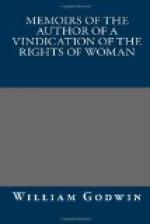CHAP. II
1775-1783.
But a connection more memorable originated about this time, between Mary and a person of her own sex, for whom she contracted a friendship so fervent, as for years to have constituted the ruling passion of her mind. The name of this person was Frances Blood; she was two years older than Mary. Her residence was at that time at Newington Butts, a village near the southern extremity of the metropolis; and the original instrument for bringing these two friends acquainted, was Mrs. Clare, wife of the gentleman already mentioned, who was on a footing of considerable intimacy with both parties. The acquaintance of Fanny, like that of Mr. Clare, contributed to ripen the immature talents of Mary.
The situation in which Mary was introduced to her, bore a resemblance to the first interview of Werter with Charlotte. She was conducted to the door of a small house, but furnished with peculiar neatness and propriety. The first object that caught her sight, was a young woman of a slender and elegant form, and eighteen years of age, busily employed in feeding and managing some children, born of the same parents, but considerably inferior to her in age. The impression Mary received from this spectacle was indelible; and, before the interview was concluded, she had taken, in her heart, the vows of an eternal friendship.
Fanny was a young woman of extraordinary accomplishments. She sung and played with taste. She drew with exquisite fidelity and neatness; and, by the employment of this talent, for some time maintained her father, mother, and family, but ultimately ruined her health by her extraordinary exertions. She read and wrote with considerable application; and the same ideas of minute and delicate propriety followed her in these, as in her other occupations.
Mary, a wild, but animated and aspiring girl of sixteen, contemplated Fanny, in the first instance, with sentiments of inferiority and reverence. Though they were much together, yet, the distance of their habitation being considerable, they supplied the want of mere frequent interviews by an assiduous correspondence. Mary found Fanny’s letters better spelt and better indited than her own, and felt herself abashed. She had hitherto paid but a superficial attention to literature. She had read, to gratify the ardour of an inextinguishable thirst of knowledge; but she had not thought of writing as an art. Her ambition to excel was now awakened, and she applied herself with passion and earnestness. Fanny undertook to be her instructor; and, so far as related to accuracy and method, her lessons were given with considerable skill.
It has already been mentioned that, in the spring of the year 1776, Mr. Wollstonecraft quitted his situation at Hoxton, and returned to his former agricultural pursuits. The situation upon which he now fixed was in Wales, a circumstance that was felt as a severe blow to Mary’s darling spirit of friendship. The principal acquaintance of the Wollstonecrafts in this retirement, was the family of a Mr. Allen, two of whose daughters are since married to the two elder sons of the celebrated English potter, Josiah Wedgwood.




